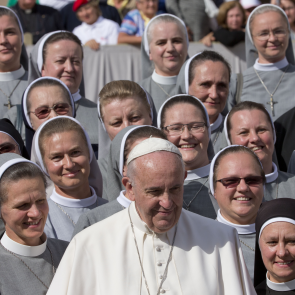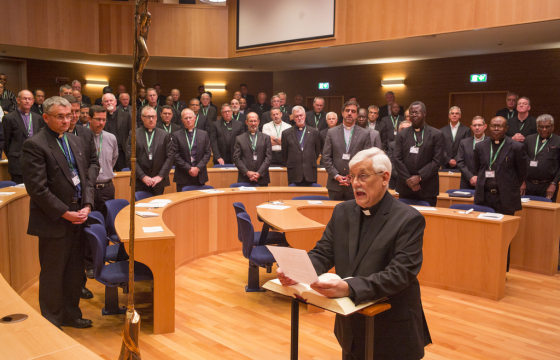A transcript of Francis’s, off-the-cuff dialogue with delegates to the 36th General Congregation of the Society of Jesus - the Jesuit governing body which met recently in Rome - was published yesterday (24 November) in Spanish, Italian and English on the website of the Italian Jesuit journal La Civiltà Cattolica.
In the one-hour-and-a-half discussion on 24 October, the Pope spoke in Spanish, but made revisions to the Italian translation of the transcript given to him by La Civilta Cattolica’s editor, Fr Antonio Spadaro.
His main themes were the deficiencies of contemporary politicians and the importance of combating a tendency towards rigid moral judgement on the part of the priesthood.
“Countries lack those great politicians who were able to spend themselves seriously for their ideals and were not afraid of dialogue or struggle, but went ahead, with intelligence and with the charism specific to politics,” he told the Jesuits.
He focussed specifically on attempts by political leaders while in power to reform a country’s constitution to allow them to serve another term in office.
Such attempts have been frequent in the Pope’s native Latin America, including in Argentina, where President Cristina Kirchner failed to secure enough support in 2013 for such a bid. Last year Evo Morales, the Bolivian president, modified the constitution to allow him a potential fourth mandate.
Mr Morales, President Rafael Correa in Ecuador served third terms after amending their constitutions, while President Daniel Ortega of Nicaragua won an unconstitutional third term in an election on 6 November characterised by massive abstention and the exclusion of opposition party candidates.
In Africa, Democratic Republic of Congo President Joseph Kabila broke his country's constitution by failing to have presidential elections this year. Rwanda's President Paul Kagame has confirmed that he will seek re-election for a third term in 2017, after a referendum approved constitutional changes to allow him to run for three further terms, potentially until 2034.
The Pope told the Jesuits: “I believe that here the Society [of Jesus], in its work of teaching and raising awareness, must work with audacity to convince everyone that a country cannot grow if it does not respect the legal principles which that country itself has put in place to ensure future governability.”
On moral issues Francis warned that a number of seminaries had reverted to legalism and rigidity, rather than discernment, leading to a conception of morality with black-and-white prescriptions.
“I am very afraid of this,” he said, comparing it to the “decadent scholasticism” taught prior to the Second Vatican Council. “The whole moral sphere was restricted to ‘yes you can,’ ‘you cannot,’ ‘up to here yes but not here,'” he said, describing it as “a morality very foreign to discernment”.
While avoiding falling into the kind of relativism in which there is no objective morality, Francis said it was “necessary to bring forward again the great wealth contained in the dimension of discernment” which was characteristic of the “great scholasticism” of St Thomas Aquinas and St Bonaventure.
He said their scholastic method - holding to general principles, but nuancing and modifying them without changing the principle when faced with real-life situations - informed both the Catechism of the Catholic Church and Francis’s apostolic exhortation on the family, Amoris Laetitia.
That exhortation, that asks priests to accompany remarried couples in a discernment about their situation, was written, Francis said, following “the discernment made by the whole Church through the two synods”.
In another shift from “black-and-white” views, this time in the field of culture, the Pope urged the Jesuits to be on the side of “inculturation”, and to resist the imposition of uniformity in faith, ideas or culture. He reminded them of the “centralist type of hermeneutic” behind colonisation.
The Church today had to “interpret things differently, valuing each people, their culture, their language”, he said.
On the question of vocations, Francis blamed clericalism for suffocating the call to priestly and religious life. “Clericalism does not allow growth, it does not allow the power of baptism to grow,” he said, insisting that “vocations exist - you just have to know how to propose them, and how to attend to them”.
He described a failure to promote vocations as “suicide” and compared it to a form of sterilisation, “Not promoting vocations is an ecclesial tubal ligation,” he said, because “it does not allow that mother [the Church] to have her children”.
Vocations are the subject of the next synod of bishops in 2018.




 Loading ...
Loading ...